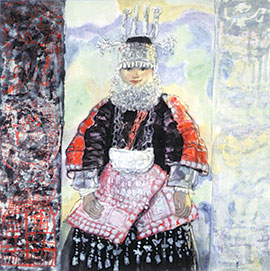
Genesis
Population: 7,383,600
Provinces: Guizhou, Hunan, Yunnan, Guangxi, Sichuan, Hainan, Hubei
Related to the Hmong of Southeast Asia, the Miao people lived in central China during ancient times. Their ancestors established the Three-Miao State along the middle and lower reaches of the Yangtze River during the Zhou Dynasty. Pushed southward by the rising tide of the Han, Miao clans became scattered and isolated from one another among the Miaolong and Wuling Mountains. Forming strong groups with diverse dialects, customs, and dress, there was no love-lost between them. In the past, Chinese governments often recruited them as mercenaries against one another (as can be seen in the popular 1992 Jet Li movie Asia Invincible).
Despite comprising several dialects, the Miao peoples' language as a whole belongs to the Sino-Tibetan family. They had no written script until 1957, when a Romanization system was created. Because of the lack of a written language, oral history and tradition was passed on by songs and dances.
The friendly Miao are well known for their hospitality. Living in mountainous communities, they generally depend on farming and animal husbandry. Close-knit, they often work together on farms and construction. Besides song and dance, Miao also excel at embroidery.
Women's headdresses take special importance in Miao culture. When a girl is born, her parents will start saving money to make fancy silver head ornaments that can weigh several kilograms.
Traditional Miao religion is animistic. Important celebrations include the Miao New Year (Eighth Day of the Fifth Lunar Month) and the Dragon Boat Festival.
Custom
Six-Strand Straw Shoes
Keepsakes of the girls of the Miao nationality to their lovers. Usually, the straw shoes are made of four strands at the sole but those sent to lovers have six strands. The story goes that a Miao girl sent her lover a pair of straw shoes. Before long, she found the shoes disposed outside her home and her lover disappeared. So the girl was very sad. Later she was engaged to anther young man by sending him a pair of straw shoes with six strands as a keepsake. After the marriage, the couple lived to an old age, harmoniously and happily. The six strands, that is, two plus four, are made of linen. Soles of the shoes are made of rice stalk which is rolled evenly and with varied patterns. The shoe laces are made of blus linen, which is soft and good looking.
 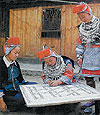
  
Eighteen Rules in Singing in anti -phonal style
This is miaos' rules for singing in anti phonal style. If someone breaks the rules, he or she will be driven out of the singing spot. In the wedding, praising songs will be sang and so will historical stories, legends, astronemy and geotogy. After the older people go away, the young may sing love songs which have to be implicit. At parting, parting songs will be sang. When lads and lasses sing in artiphonal style, though falling in love, lads are not allowed to give keepsakes to lasses in public. At wedding feast, no riddle song is sung because a riddle song will cause quanels, and damage the happy atmosphere. Singing in antiphonal style, young men are forbidden to invite marred women or engaged girls. If they make a wrong choice, the females will refuse the invitation and return the keepsakes sent by the men. On the way meeting with this singing, you should take past in it. If you are in a hurry, you should sing to show apotogy.
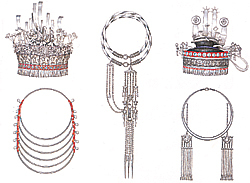
Visiting Other Stockaded Villages
Visiting other stockaded villages is a sociable activity for the Miao youth between males or females. The young people will walk in the moonlight so it's called "stepping on the moon". Whenever there is moonlight, lads in group, three or five, playing the flute or violin, walk everywhere in other stockaded villages to look for lasses for singing in antiphonal style while lasses stay in a certain wooden cabin to spin yarn, talking and lavghing. Hearing the music, they will stop talking
and laughing,and just spin the yarn. Hearing just spinning, lads know the lasses are waiting and will climb up the stairs quietly and then sit around the fire to plqy their musical instruments. Thus the girls will sing to the music. If a lad and a lass take a farry to each other, they will sing by themselves until daybreak with enthusiam never ending. The lad will declare his love to the lass openly but the lass will not easily accept it. A few days laters, the lass will ask her close friends to dig earth in the plot near the lad's, and the lad will come to help, which means the bridge of love has been made. In the next 3rd lunar month, the young lovers will sow seeds in the plot they once dug. In autumn, the two will reap their crop like picking the fruit of their love,and report to their parents about their love and decide the date of wedding. During the time for visiting other stockaded villages, parents won't interfere in their daughters' making friends
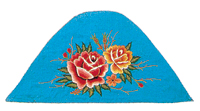
Horse Fight and Horse Race
Horse Fight and Horse Race are favourite recreational activities for the Miao nationality. After mid-rice transplanting on the sixth of the sixth lunar month, Miaos held horse fight and horse race to congratulate beforehand a bumper harvest happily
Miao Year
Miao Year is a traditional festival for the Miao nationality. The dates for the festival is not definite. Generally speaking, Miao Year is on the date for rabbit, or ox, or pig in the 9th, or 10th, or 11th lunar mouth. Miao Year festival is for the Miao nationality in Northern Guangxi. Early in the festival, people open doors and set firecrackers or popgun to the sky for three times to congratulate the festival. During the festival, folks visit their relatives or friends, congratultating each other. In some area, there is a splendid bullfight or house race. Playing the reed-pipe wind instrument is a traditional activity in the Miao festival. The young men will form a team of the musical instrument. When big or small musical instruments are blown, people far and wide may hear. The musical sound is melodious, loud and inspiring, full of vitality. Girls in festival attire have on their heads silver decoration resembling phoenix and dragon, silver hairpins and silver combs, dancing to the music. In this way, young people may choose their own lovers. The young men who can play the musical instrument well often win the girls favour.
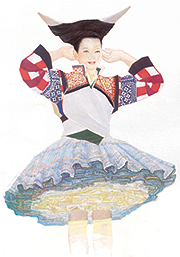
You Fang and competition of Reed-pipe Wind Instrument
You Fang is also called Gathering on the slope. This is a tradition for Miao's young people to have sociable activites on the 3rd or 5th of the 1st lunar month. Young men carry reed-pipe wind instruments while young women wear the silker decoration all over. They happily gather on the slope of a hill. Upon the beating of a gong, young men will begin to play the musical instruments. With the girls watching instrument, players try their best, turning round and jumping back and borth, dancing with power to the lively rhythm. Girls are also dancing to the music while paying attention to those they like. If they find those they take fancy to, they will go over to tie colourful ribbons to their musical instruments and held the ribbons to dance to the music. As it is getting dark, lovers are scattered on the slope, whispering or singing folk songs in antiphonal style, or exchanging keepsakes. Gathering on the slope is not limited to any festival but held in any agricultural slack season or on any occasion. But only the young people of a certain village take part in by themselves with no outsiders.
Festival:
The Flower Mountain Festival
The Flower Mountain Festival, also known as "Trampling in the Flower Mountain,""Playing in the Flower Mountain," "Jumping over Flower Place?±and ?°Jumping over the Flower," is the national festival of people of Miao Nationality in western and middle Guizhou Province, the Southeast of Yunnan Province and the south of Sichuan Province. The dates of the festival differ between areas. Some festivals begin in May of the Chinese traditional calendar, while others start anywhere between May and June, including the last ten days of August. A leadership team of three persons introduced jointly from several Miao Nationality Villages is responsible for the festival and they can be reappointed for three yearsseven years or twelve years.
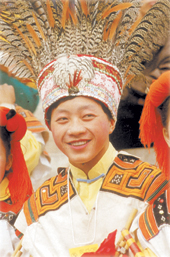 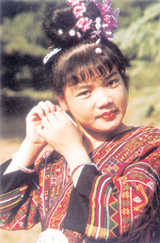
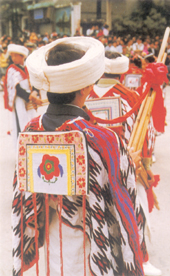
The location for the flower place is a plain area; yet, the atmosphere is quite festive. Lots of lanterns hang highly, color flags flutter about and the flower pole stands tall and upright. Men wear traditional Chinese short jackets, their heads are entwined with cyan bands, and colored belts are tied to their waists. Women also wear splendid attire and carefully dress up for the occasion. Both men and women blow reed instruments and the suona horn, beat copper drums, and sing and dance many traditional songs and dances. The Reed Dance plays the main role in the festival, while the Song Match is the main program. The Reed Dance, a pole-climbing contest, is the most remarkable event of the festival, making people feel released. When the player performs the dance, he will turn his body imitating a carp; his body reversing for 180 degrees. Such actions will be repeated again and again till he has climbed to the top of the pole. Then he will strike a pose there. The player?ˉs two feet clamp the Flower Pole with his head down toward the ground. Meanwhile, the player slides down along the pole whistling the reed. When his head is several feet over the ground, he then turns his body and jumps from the pole. His action is so deft and more beautiful than the gymnastic athlete. All the spectators are cheerful. Additional events during the festival include the "Lion Dance", wushu match, bullfight, and horse racing that differs between areas. Some places even highlight intercourse. Girls in love accept the flower umbrellas of the boys. The festival atmosphere is filled with sincere friendship and pure love.
Rites and Taboos
The customer can't eat the head , liver, legs and gallbladder of the chicken, because they are for old lady and children. When you are living, remember to say "Thank you" to the host to show your appreciation.
|
![]() 本网站由北京信息港提供网络支持
本网站由北京信息港提供网络支持











